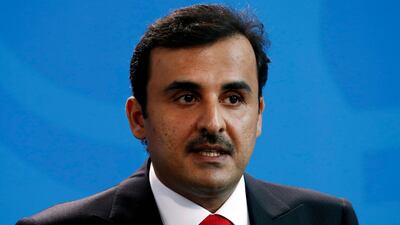Qatar made a forum on US-Islamic ties its first port of call on Sunday after the emir arrived in New York to attend the UN General Assembly.
Sheikh Tamim led the guest list on Sunday at the US-Islamic World Forum in New York hosted by the Brookings Institution. Contrary to the emailed agenda, he did not speak ahead of a scheduled meeting with Donald Trump and an address to the General Assembly.
Sheikh Mohammed bin Abdulrahman Al Thani, Qatar's foreign minister, instead gave the opening speech at the forum.
The minister did not address the 105-day dispute between Doha and its neighbours. Instead Sheikh Mohammed focussed on messages of coexistence, and challenges in the US-Islamic relations 16 years after the 9/11 attacks. Organisers at Brookings told The National that questions related to the change in the schedule of the emir should be referred to the Qatari embassy.
Eight kilometres separated the Qatar-backed forum from a conference on the cultural rapprochement between the USA and the Islamic world. The event organised by the Muslim World League offered its own vision of relations between the Islamic world and the United States.
Mohammed bin Abdulkarim Al Issa, secretary general of the League, led the two-day meeting at the Park Hyatt in Manhattan, which he said represented a much needed bridge between the Islamic civilisation and other cultures. The aim of the meeting, which drew an audience of hundreds of religious and community leaders, was to show that the values of righteousness, justice and charity came from within Islam.
Dr Al Issa said high levels of trust, honest dialogue and close interaction between Americans and the Islamic world are vital to the global community.
He said religious and intellectual extremism had a diminishing foothold in the Muslim world and that its proponents were constantly seizing any opportunity to antagonise.
“Extremism will bet on anything in order to regain its strength and attract new elements such as betting on the provocations of counter-extremism or Islamophobia,” Dr Al Issa said.
Yousef bin Ahmad Al Othaimeen, the secretary-general of the Organisation of Islamic Co-operation, also spoke at the forum at the Park Hyatt.
He said that the OIC makes great efforts to engage the US in order to establish a meaningful partnership to promote common understanding and counter-extremism.
“We have common objectives to the goal of establishing a culture of peaceful coexistence and the promotion of human dignity,” Mr Al Othaimeen said.
Shmuley Boteach, a prominent American Jewish rabbi, and backer of the Muslim World League conference said Qatar had made an effort to recruit Jewish leaders as part of its public relations campaign in the dispute with other Arab countries.
The rabbi took a full page advertisement in The New York Times at the weekend that declared: "Meeting with Qatar means murder".
The advert was in response to reports that Qatar had hired a lobbyist Nick Muzin to organise a meeting between the Qatari emir and Jewish leaders during the UN General Assembly.
Mr Boteach laid out four challenges to Qatar. To cease funding Hamas, to expel the militant group’s leader Khaled Meshaal, purge anti-Jewish views from Al Jazeera and facilitate the return of the remains of Israelis held by Hamas.
Jewish leaders have expressed amazement that Mr Muzin made the approach on behalf of Qatar.
A report by Forbes magazine said Mr Muzin approached Malcolm Hoenlein from the Conference of Presidents of Major American Jewish Organizations, Howard Kohr of the American Israel Public Affairs Committee, and Jonathan Greenblatt, of the Anti-Defamation League.
Other people at the event included Father Brian McWeeney of the New York Archdiocese. He said: “Our enemies are not other people of faith but our common enemy of secularism and the me society.”
Bill Richardson, the former US ambassador to the UN, said last week that he was dismayed that Qatar had not responded to his mediation efforts to return the bodies.
The Brookings forum took as its theme “Crisis and Cooperation”. The four plenary sessions focused on stabilising the Middle East, addressing the challenges of the growing refugee population worldwide, and building international efforts to counter the terrorist threat.
It was the first time it had been held to coincide with the General Assembly.
“For 13 years, the US-Islamic World Forum has been an opportunity for American and European scholars and policy-makers to meet and interact with scholars and policy-makers from across the Muslim world.” said Bruce Jones, vice president and director of the Foreign Policy program at the Brookings Institution. “This year, we are happy to bring the event to the side lines of the UN General Assembly in New York, since these challenges are truly at the centre of world events.”

